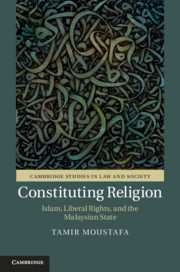Acknowledgments
This book has been a long time coming. Constituting Religion was initially conceived as a comparative study of Islamist litigation in Egypt, Malaysia, and Pakistan. However, I quickly realized that a significant treatment of the nexus of law, religion, politics, and society in any one of these three countries would require an enormous investment of time and energy. Having already been captivated by initial fieldwork in Malaysia, I chose to shift my full attention to understanding the Malaysian experience as best I could. It is a decision that I have not regretted for a minute.
Nearly a decade later, I am indebted to dozens of Malaysian activists, academics, lawyers, journalists, and others, many of whom invested considerable time and energy helping me with this project. I am especially indebted to Shanmuga Kanesalingam, Ahmed Farouk Musa, Jacqueline Surin, Shanon Shah, Norani Othman, Zainah Anwar, Masjaliza Hamza, Ibrahim Suffian, Azmil Tayeb, Clive Kessler, and Sharaad Kuttan for their patience with my endless questions, and their warm companionship during my time in Malaysia. I am also grateful to Damina Khaira, Aston Paiva, Seh Lih Long, Ravi Nekoo, Zaid Kamaruddin, Philip Koh Tong Ngee, Tan Beng Hui, Malik Imtiaz Sarwar, Patricia Martinez, Yusri Mohamad, Abdul Rahim Sinwan, Tun Hamid Abdul Mohamad, Edmund Bon Tai Soon, Fadiah Nadwa Fikri, Haji Mahamad Naser Bin Disa, Haji Mohamed Haniff Khatri Abdulla, Nandita Solomon, Dato Cyrus V. Das, Nizam Bashir bin Abdul Kariem Bashir, Chin Oy Sim, Suriani Kempe, Chandra Muzaffar, Andrew Khoo, Noraida Endut, Latheefa Koya, Azmi Sharom, Reverend Sivin Kit, Uthayakumar Ponnusamy, Mazeni Alwi, Reverend Thomas Philips, Prematilaka Serisena, Goh Keat-Peng, Norhayati Kaprawi, Al Mustaqeem Mahmod Radhi, Mohamad Hashim Kamali, Benjamin Dawson, KJ John, Zaid Ibrahim, Rozana Isa, Ratna Osman, Marina Mahathir, Ivy Josiah, and Tan Kong Beng. Finally, parts of this study could not have been completed without superb research assistance in Malaysia from Azmil Tayeb, Chang Chee Er, and Dinash Kathirkama, and in Vancouver from Tracy Lim Sim Yee and Erin Morissette.
Financial support for this project came from the Carnegie Corporation of New York, through the Carnegie Scholars Program on Islam and Muslim Societies; the Social Sciences and Humanities Research Council of Canada (SSHRC), through an Insight Grant; and the Stephen Jarislowsky Chair in Religion and Cultural Change at Simon Fraser University.
The Islamic Legal Studies Program at Harvard Law School provided an ideal environment to organize my thoughts and to write. I am also grateful for having had the opportunity to present draft chapters at the Law and Public Affairs Program (LAPA) at Princeton; the Islamic Law and Society Workshop organized by the Department of Middle East and Islamic Studies at New York University; the Islamic Legal Studies Program (ILSP) at Harvard Law School; the Comparative Law and Society Studies (CLASS) Center at the University of Washington; and through invited lectures at the University of British Columbia, McGill University, and Concordia University. I was especially honored by the opportunity to share research findings with the Malaysian advocacy group, Sisters in Islam, and with the Malaysian Bar Council through their National Strategic Litigation Consultation on Freedom of Religion.
This book was also enriched by my participation in two extraordinary research groups. The first group, convened by Mirjam Künkler, Hanna Lerner, and Shylashri Shankar at the Center for Interdisciplinary Research (ZiF), Bielefeld University, focused on the theme of “Balancing Religious Accommodation and Human Rights in Constitutional Frameworks.” The second research group, convened by Saba Mahmood, Elizabeth Shakman Hurd, Winnifred Sullivan, and Peter Danchin and funded by the Henry R. Luce Initiative on Religion and International Affairs, focused on the “Politics of Religious Freedom.”
I am also grateful to many friends and colleagues who stimulated my thinking along the way. I would like to thank Hussein Agrama, Rumee Ahmed, Onur Bakiner, Asli Bâli, Azza Bassarudin, Felicitas Becker, John Bowen, Nathan Brown, Ayesha Chaudhry, Jeffrey Dudas, Zachary Elkins, Mohammad Fadl, Kambiz GhaneaBassiri, Ellis Goldberg, Andrew Harding, Laura Hatcher, Iza Hussin, Ahmed Fekry Ibrahim, David Leheny, Hanna Lerner, Saba Mahmood, Mark Massoud, David Mednicoff, Sally Engle Merry, Michael McCann, Jamie Meyerfeld, Joel Migdal, Matthew Nelson, Jaclyn L. Neo, Mona Oraby, Arzoo Osanloo, Michael Peletz, Asifa Quraishi-Landes, Intisar Rabb, Jeffrey Sachs, Kim Scheppele, Benjamin Schonthal, Yuksel Sezgin, Elizabeth Shakman Hurd, Rachel Stern, Kristen Stilt, Frank Vogel, Amanda Whiting, Malika Zeghal, and my colleagues at Simon Fraser University, particularly Elizabeth Cooper, John Harriss, Michael Hathaway, and Geoff Mann. I am especially indebted to those friends and colleagues who provided extensive feedback on draft chapters: Onur Bakiner, Ceren Belge, Shanmuga Kanesalingam, Mirjam Künkler, Jeremy Menchik, Matthew Nelson, Jeffrey Sachs, Benjamin Schonthal, Elizabeth Shakman Hurd, and Winnifred Sullivan. John Berger at Cambridge University Press served, once again, as a wonderful editor. Emma Collison, also at Cambridge University Press, was a terrific help during the production process. I hope I have not left anyone out, but fear that it is all too easy given the number of people who assisted me and pushed my thinking along the way.
Finally, I want to thank my wife, Nina Lobo, for the love and support that helped me to see this project through to completion. This book is dedicated to her, to our daughter, Salma, and in loving memory of my father, Mohamed Eid Moustafa.



